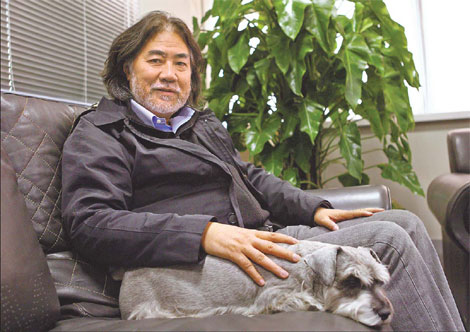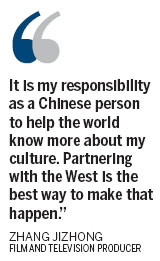Heading west with Journey to the West
By Joseph Christian (China Daily)
Updated: 2010-05-10 09:53
 |
Large Medium Small |

Beijing native is now one of the country's most famous television producers
With long gray hair and a matching beard, 59-year-old Beijing native Zhang Jizhong looks the part of a creative maverick.
He became one of China's most famous television producers since he first shot to prominence years ago with his epic production of The Romance of Three Kingdoms, and he might soon do it again with China's biggest movie, Journey to the West.
Zhang is a household name in China for his ability to film massive battle scenes and construct elaborate sets.
His productions have even helped launch the career of Chinese stars such as Liu Yifei, Huang Xiaoming, Hu Jun and Zhou Xun.
Even though Zhang has enjoyed both critical acclaim and financial success, he said neither lured him to the entertainment business.
"It has always been my aim to make my works based on the essence of Chinese culture. I use themes such as benevolence, loyalty, trust and heroism," Zhang said.
However, on trips that Zhang has taken overseas, he often feels that China and Chinese culture are largely misunderstood.
"Sometimes people have only been introduced to China's negative aspects; they haven't seen the entire picture," he said.
Zhang is not alone in thinking this way. Many Chinese today, from students to government officials, worry that China is not doing enough to promote its culture.
Zhang's experiences gave him a vision. Why not use a blockbuster movie as a vehicle to help the West understand more about Chinese culture.
"Movies are a great medium. They can be easily spread and are accepted by a wide audience. After all, that is how so many Chinese know about the American spirit," said Zhang.

However, Stanley Rosen, director of the East Asian Studies Center at the University of Southern California and a Chinese film researcher, cautioned: "Yes, movies are great, but things can easily get lost in translation. Chinese directors like Zhang Yimou have already complained about this."
To spearhead his efforts, Zhang founded Beijing Zhang Jizhong Cultural Development (ZJZCD) in June 2007.
Soon, work was under way to turn one of China's four classic novels, Journey to the West, into a blockbuster movie trilogy.
The movies are based on Wu Cheng'en 16th century classic and will feature the widely known Monkey King as the main protagonist.
As Zhang bills it, "It is Lord of the Rings meets Wizard of Oz in ancient China."
With each movie budgeted at $100 million, Zhang's production is far and away the most expensive Chinese effort so far.
"I chose Journey to the West because I think it is an excellent representation of Chinese culture," he said.
On the surface it is about a journey to fetch the Buddhist scriptures from India, but it is much deeper than that.
It highlights Chinese philosophy through how the Monkey King and his companions try to overcome their lust and desire to be more pure-minded," Zhang said.
Even though the money and effort being put into Zhang's production is record-breaking for Chinese cinema, that is not the only notable thing.
The work on the Monkey King trilogy is breaking new ground in East-West cinematic cooperation.
While plenty of Chinese movies have been distributed in Western counties, and while some Chinese stars have even made it big in Hollywood, such a massive attempt at co-production has never occurred between Beijing and Hollywood.
It is a daunting undertaking, but the promise of combining the cinematic experiences and expertise of East and West are well worth the challenges.
Already Chinese art directors based in Beijing are working out details with computer graphic gurus in Hollywood.
Chinese and Western writers are striking a balance on how to keep the action moving, while staying true to Journey to the West.
"It is my responsibility as a Chinese person to help the world know more about my culture. Partnering with the West is the best way to make that happen," Zhang said.
Zhang's ideas have been received with excitement and curiosity in Hollywood.
"In the end, we are not so different," Zhang said. "The Monkey King speaks of values that are shared between East and West. Everyone can relate to pursuing freedom, protecting your family and fighting with figures of authority."
While there is no release date currently set for the first movie, Zhang was able to reveal that the movie would be filmed in English and most likely also in 3-D.
Despite Zhang's optimism, Rosen still sees areas where obstacles remain.
"A trilogy is a big risk financially and I think it could be very easy for Western audiences and critics to misunderstand his passion. But the fact it is in English and has input from Hollywood will help to break down some of these barriers," he said.
Zhang's production is pegged to be the biggest thing that has ever come out of Chinese cinema. But more importantly, the trilogy will offer a chance for Westerners to understand more about China.